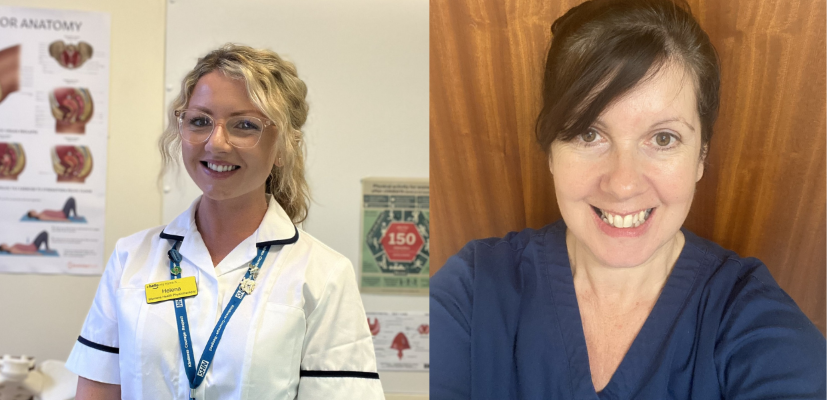Our specialist women’s health physiotherapy services are providing a vital lifeline for women previously too scared and embarrassed to leave their home.
Here at NHS Humber Health Partnership, which operates Scunthorpe General Hospital, Grimsby’s Diana Princess of Wales Hospital, Goole and District Hospital, Hull Royal Infirmary, Castle Hill Hospital and community services across northern Lincolnshire, our dedicated and highly skilled team of specialist pelvic health physiotherapy team provide the very best care for women with pelvic health problems.
The team are working with hundreds of women suffering with pelvic floor dysfunction which can leave them with urinary and faecal incontinence, pelvic organ prolapse, pelvic pain and more.
As part of the new national perinatal pelvic health strategy (PPHS), we have recruited extra physiotherapists to help with the workload across our hospitals with further recruitment underway to support an Advanced Practice Physiotherapist. The aim of the PPHS is to provide focus on prevention, identification, and timely treatment for pelvic floor dysfunction during pregnancy and for at least 12 months after birth.
Helena Trought, who works at Scunthorpe and Grimsby hospitals, said: “This service makes such a difference to women and their quality of life. Women tell me it has given them a newfound confidence; they are able to leave the house without worrying about having an accident. One woman told me she could now go on holiday, wear a bikini, and get in the pool with her kids without the fear of embarrassing continence issues.”
Pelvic floor dysfunction is when the muscles or surrounding tissue are not working as they should do which can lead to faecal and urinary leakages when coughing, sneezing, laughing, running, or just standing up. It can also result in pelvic organ prolapse sexual dysfunction and more.
Physiotherapy helps retrain and strengthen the pelvic floor muscles and can improve or prevent the symptoms.
Helena said: “It is often perceived as an older person’s issue. However, the majority of women I see are young women and women who have suffered an injury during childbirth, which is when they are most vulnerable. I am also seeing teenagers who are experiencing problems.
“The main thing is for women to seek help and not sit in silence at home too scared to go out, too embarrassed to speak up and seek help from their care provider. I want to empower women to feel confident in their own bodies throughout their lifespan. I want women to be able to live their lives to the full and not be blighted by something which can be treated. They don’t have to live in isolation, or in pain both of which can impact on their mental health.”
Cleethorpes mum of one Laura gave birth to her daughter at Grimsby hospital last October during which she suffered a third-degree tear. She said: “My midwife was absolutely amazing, and I am still in touch with her today. She explained everything to me before I went to theatre for the tear to be repaired.
“I was slightly concerned about any lasting damage as I am a physically active person and exercise regularly, so I didn’t want to experience any incontinence or prolapses now or in the future. At my six-week check post birth my consultant referred me to Helena.
“She gave me pelvic floor exercises which I had to do in my own time, and I met regularly with her for treatment. She always updated me on my progress and being the competitive person I am I always wanted to keep improving. She kept reiterating how the exercises needed to become part of my everyday life moving forward.”
During her treatment, Laura did a range of pelvic floor exercises with the aim of strengthening the muscles. This is because the tear had affected her muscles and the way they contracted. At the start of her treatment there was minor strength on one side, and none on the other. Today, her pelvic floor muscles are back to normal and working as they should.
Laura added: “Helena took the time to get to know me, as well as my daughter as she was often with me at my appointments. She was a significant part of my recovery and I have to thank her for re-building my pelvic floor. She was so kind and considerate. At the end of my treatment, I felt some sadness as Helena had become part of my mothering life. I’ll forever be thankful to her. If any new mums out there get offered a women’s health physio, take it!. They’re superheroes.”
Nicole Haslam, another one of our specialist pelvic health physiotherapists who works in Hull, said: “I am privileged to work in this speciality and have spent many years developing my skills to best treat these ladies. Women’s health has for so long been a poor relation part of healthcare and I am passionate about spreading the word and helping women of all ages. Seeing the anxiety and worry visibly melt away as women are given the opportunity to explain their problems and really feel heard. The relief on their faces when they realise that someone actually hears what they are saying and understands their problems is probably the most satisfying aspect of my role.”
The service, which is provided at Grimsby, Scunthorpe, and Hull currently sees on average 130 women per week. Women can be referred in a number of ways including from urogynaecology, obstetrics, midwifery, nurse practitioners, other allied health professionals and by GPs. If you think the service could help you, then speak to your healthcare provider and ask for a referral.
The team works to help women with some of the most embarrassing and not talked about topics in health. They want to be able to help women live healthier lives, for longer.

